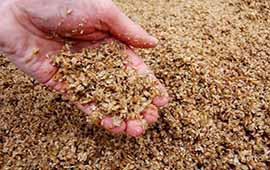Brewer grains are waste products that are generated during brewing.
This is the thick that remains after boiling and sucking the wort from the barley, but at the same time small parts of the kernel and shell of the grain are preserved in it. This product is used as animal feed and biogas is produced from it. 100 kg of fresh product contains 21.2 feed units and 4.2 kg of digestible protein. There is also dry brewer’s grains, in which the content of these substances is even higher – up to 76 feed units and up to 17 kg of digestible protein. The use of this product at the moment can be increasingly found in the production of biogas, but this product is used less often as feed for cows, oxen or pigs.
But on the other hand, they try to include grain from beer in the composition of mixed feed, because it contains a large amount of protein that is resistant to degradation in the rumen (60%). It is also laid on silage, and during storage it does not need additives to maintain freshness. It has been established that dry brewer’s grains are able to improve the intake of the main feed and stabilize digestion, as well as prevent disorders in the work of the stomach and intestines, since it binds water in the body of animals. By the way, in a highly concentrated form, this product contains the nutritional properties of barley, but at the same time it is much cheaper in cost.
What is needed for the import and export of brewer grains to the EU
In order to export brewer grains to EU countries, the manufacturer must have the constituent papers of the exporting organization, as well as a foreign economic agreement, a transaction passport, an invoice for the cargo and an invoice with data on the weight and quantity of goods. In addition, transport documents must be available, for example, a quality certificate or a passport for the goods. It is more convenient to carry out wholesale deliveries of this product through intermediaries who will help to draw up all the necessary documents and standardize the product to the requirements of the EU countries.
Features of import and export of brewer grains
Such EU countries as Latvia, Lithuania, Estonia, Germany and Poland, as well as Spain are engaged in the import of this product. This product can be sold by transportation by both land and sea. The most expensive on sale is dry brewer’s grains, the price of which is $ 142 per ton, the cheapest is ordinary brewer’s grains with a cost of $ 0.16 per ton. You can also sell wet spent grains at $ 28 per tonne. When exporting to another country, the manufacturer may have to pay tax – in the EU it is VAT, an analogue of VAT, which is 20%. It should be understood that brewer’s grains may also be available in factories that are engaged in brewing – then the beer company will keep this product for itself. Therefore, it makes more sense to offer the spent grain directly to producers of dry feed for farm animals. In addition, this product will be purchased by large poultry farms that raise laying hens, turkeys, guinea fowls, as well as geese and ducks. For these birds, this product is most useful because it contains a lot of fiber.






